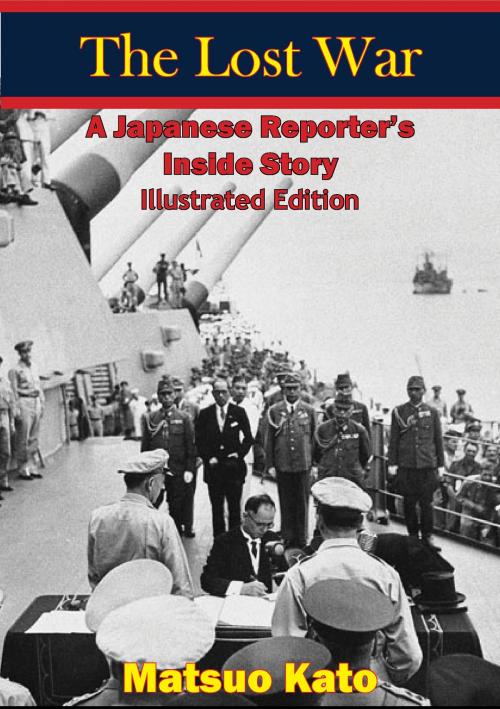The Lost War:
A Japanese Reporter’s Inside Story [Illustrated Edition]
Nonfiction, History, Germany, European General, Military, United States| Author: | Masuo Kato | ISBN: | 9781786251541 |
| Publisher: | Verdun Press | Publication: | November 6, 2015 |
| Imprint: | Verdun Press | Language: | English |
| Author: | Masuo Kato |
| ISBN: | 9781786251541 |
| Publisher: | Verdun Press |
| Publication: | November 6, 2015 |
| Imprint: | Verdun Press |
| Language: | English |
Includes The Bombing Of Japan During World War II illustrations pack with 120 maps, plans, and photos
“Masuo Kato, an American educated Japanese newspaper man, represented the Domei news agency in Washington from 1937 to 1941, was repatriated in the first exchange. and served thereafter in Domei head. quarters in Tokyo. This little book, written following Japan’s surrender with the assistance of an American occupation officer, reflects the attitudes of the “Westernized” Japanese.
The author indicates his skepticism over Japan’s policies of aggression, but describes his own participation in her wartime propaganda machine. One cannot fail but question the degree to which such an individual now accepts American occupation policies.
The book gives a graphic account of wartime conditions in Japan. It tells of the changes in political leadership, terminating in the maneuvering of figures around the Throne preceding unconditional surrender. Kato attributes the acceptance of defeat by the people in large measure to the Emperor’s radio appeal for maintenance of order.”— John Masland, Dartmouth College
Includes The Bombing Of Japan During World War II illustrations pack with 120 maps, plans, and photos
“Masuo Kato, an American educated Japanese newspaper man, represented the Domei news agency in Washington from 1937 to 1941, was repatriated in the first exchange. and served thereafter in Domei head. quarters in Tokyo. This little book, written following Japan’s surrender with the assistance of an American occupation officer, reflects the attitudes of the “Westernized” Japanese.
The author indicates his skepticism over Japan’s policies of aggression, but describes his own participation in her wartime propaganda machine. One cannot fail but question the degree to which such an individual now accepts American occupation policies.
The book gives a graphic account of wartime conditions in Japan. It tells of the changes in political leadership, terminating in the maneuvering of figures around the Throne preceding unconditional surrender. Kato attributes the acceptance of defeat by the people in large measure to the Emperor’s radio appeal for maintenance of order.”— John Masland, Dartmouth College





![Cover of the book Of Rice And Men [Illustrated Edition] by Masuo Kato](https://www.kuoky.com/images/2015/november/300x300/9781786253255-tQ9N_300x.jpg)



![Cover of the book Analysis Of Deep Attack Operations: Operation Bagration, Belorussia, 22 June - 29 August 1944 [Illustrated Edition] by Masuo Kato](https://www.kuoky.com/images/2014/august/300x300/9781782895459-fPbK_300x.jpg)



![Cover of the book Give Us This Day [Illustrated Edition] by Masuo Kato](https://www.kuoky.com/images/2015/november/300x300/9781786251534-2xIN_300x.jpg)

